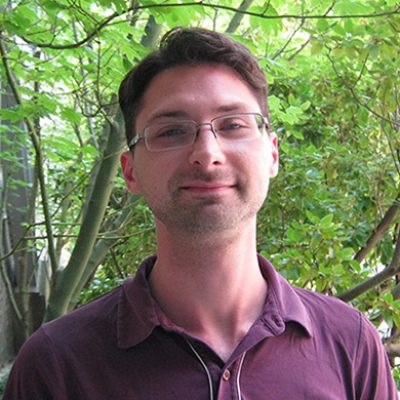
Associate Professor
Dr. Ed Kroc joined the Department of Educational and Counselling Psychology, & Special Education in 2018 as an Assistant Professor in MERM. Dr. Kroc received his PhD in Mathematics at UBC and completed his M.Sc. (Applied Mathematics in Statistics), and B.Sc. (Mathematics) at DePaul University in Chicago, Illinois.
Scholarly Interests:
Measurement, applied and theoretical research methodology and best practice, spatio-temporal modelling, causal inference, urban ecology, life cycle of gulls
EPSE 592 Experimental Designs and Analysis
EPSE 596 Correlational Designs and Analysis
EPSE 594 Meta-Analysis: Quantitative Research Synthesis
EPSE 581C Causal Inference for Applied Researchers
EPSE 581C Bayesian Methods
EPSE 682 Multivariate Designs and Analysis
University of British Columbia, 2015, Ph.D., Mathematics
DePaul University, 2007, M.Sc., Applied Mathematics in Statistics
DePaul University, 2006, B.Sc., Mathematics
The gap between modern statistics and applied “best practice”: Each applied science has its own methodological traditions and “best practices.” While the discipline of statistics often evolves in tandem with developments in some applied fields, there almost always exists a gap between modern methods in statistics and what are considered modern analytical methods in various applied sciences (e.g., Kroc & Astivia, 2021). One of my major programs of research is investigating how the most advanced statistical methods can and should be employed in the social, health, and natural sciences. This entails working with a variety of collaborators across disciplines, tailoring modern statistical methods to fit particular disciplinary needs, and educating applied practitioners about optimal quantitative procedures.
Rehabilitating measurement: the forgotten child of statistics: The field of statistics has long recognized the importance of study design, sampling, estimation, inference, and modelling, both mathematically and in the pursuit of scientific knowledge. Over the past few decades, computation and communications have rightfully earned their places alongside these pillars of statistics. However, the concept of measurement remains relatively forgotten. My major theoretical work aims at remedying this neglect by developing a general and useable theory of statistical measurement that can be seamlessly integrated into applied modes of estimation, inference, and modelling. Fixed measurements (i.e. sample measurements that generate deterministic values) are surprisingly uncommon in the social sciences; random-variable-valued measurements are the norm (Kroc, 2020). These more general measurements also commonly appear in the health and natural sciences. A robust mathematical theory is required to correct for potential bias and artificially distorted measures of uncertainty when performing inferences that are otherwise naive to the statistical nature of measurement.
Ecology and the life of the urban gull: My main applied passion is urban ecology and, in particular, the lifestyles of the urban gull. Humans have drastically transformed nearly every habitat on the planet over the past 150 years, but none more so than those areas that we now consider “urban.” Some species have adapted remarkably well to this novel environment, yet little is understood about how nonhuman species use the urban environment and how an urban ecosystem actually functions. I try to understand these questions through the lens of the gull family, which contains many species that have adapted to and thrived among our cities. The Glaucous-winged Gull (Larus glaucescens) of the Salish Sea is my main species of focus (e.g., Kroc, 2018; Blight, Bertram, & Kroc, 2019), although I do study the urban lifestyle of most North American gulls.
Other interests: I am greatly interested in modern statistical methods in spatial and temporal modelling, particularly within the context of Bayesian estimation and mixed effects modelling. While these methods have many obvious and important applications in the field of ecology, they also arise from some quite beautiful and intricate mathematics. I have always been interested in causal inference from both a theoretical and an applied perspective. I remain highly skeptical of most hard claims of causal inference in purely observational frameworks, usually due to what I find are an untenable edifice of practically untestable assumptions. Perhaps a function of my applied scientific interests, I care about small data problems. Data are usually extremely costly and difficult to obtain in my line of work, and so asymptotics and well-mixing properties are rarely applicable.
-Kroc, E., Astivia, O.L.O. (2021). The importance of thinking multivariately when setting subscale cut-off scores. Educational and Psychological Measurement, online first, 1-22. https://doi.org/10.1177/00131644211023569
-Kroc, E. (2020). Measurement protocols, random-variable-valued measurements, and response process error: Estimation and inference when sample data are not deterministic. PLoS ONE, 15(10). https://doi.org/10.1371/journal.pone.0239821
-Kroc, E., Zumbo, B.D. (2020). A transdisciplinary view of measurement error models and the variations of X = T + E. Journal of Mathematical Psychology, 98, 1-9.
-Blight, L.K., Bertram, D.F., Kroc, E. (2019). Evaluating UAV-based techniques to census an urban-nesting gull population on Canada’s Pacific coast. Journal of Unmanned Vehicle Systems, 7(4), 312-324.
-Kroc, E. (2018). Reproductive ecology of urban-nesting Glaucous-winged Gulls (Larus glaucescens) in Vancouver, BC, Canada. Marine Ornithology, 46(2), 155-164.
-Kroc, E., Zumbo, B.D. (2018). Calibration of measurements. Journal of Modern Applied Statistical Methods, 17(2), 2-28.
-Busta, L., Hegebarth, D., Kroc, E., Jetter, R. (2017). Changes in cuticular wax coverage and -composition on developing Arabidopsis leaves are influenced by wax biosynthesis gene expression levels and trichome density. Planta, 245(2), 297-311.